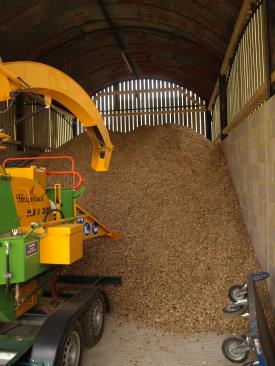Bringing a modicum of Christmas cheer to the renewable heat sector, BEIS has finally offered a confirmed budget and increased policy certainty to 2021. Many of the adjustments to the Renewable Heat Incentive have been altered from the original consultation proposals, so the NFU is pleased that the Government has been listening to what we and other stakeholders have been saying.
We are particularly satisfied that Government now recognises the effectiveness of drop-in replacement biomass boilers for non-domestic heating (albeit with a single tiered biomass heat tariff), and that a balanced portfolio of technologies is required to decarbonise the heating sector (including solar water heating, no longer threatened with an end to support). The NFU endorses the resetting of the biomethane tariff and introduction of some tariff guarantees, and we are delighted that feedstock auditing will be annual and not quarterly. However we continue to disagree with the introduction of a 50% crop feedstock cap for AD, and the inclusion of grass silage is a mistake - there is no "risk of unintended consequences such as displacement of grass for cattle feed". Fortunately all residues and wastes are exempted from this, and likely to include crop discards, beet pulp, etc. as well as straw.
The Department of Energy and Climate Change consulted last April on a number of reforms to the Renewable Heat Incentive scheme (including proposals to cut tariffs for biomass boilers by up to 61% by 2017) which we believed were potentially damaging to NFU members' interests.
Read our consultation response here.
The government also planned to remove support for solar thermal technologies, claiming it wanted to "rebalance the RHI scheme". Other proposals included capping the overall RHI budget, and allowing ministers to close the non-domestic (but not the domestic) RHI if "high levels of committed spend" occur chiefly in the commercial heating sector.
Support for energy crops used in anaerobic digestion would be restricted or removed altogether, and some kinds of heat use, such as drying or AD digestate, could be ruled ineligible.
In place of the current tariffs - around 4-5p per kWh for small and medium biomass heating boilers, and 2p/kWh for large boilers - a single tariff band for all sizes of non-domestic biomass systems of around 2-3p/kWh is proposed.
While some further tapering-off of tariff support was expected, it was the projected levels of future deployment that alarmed the biomass heat sector, currently dominated by farmer uptake. The government expected to support just 60 large non-domestic biomass installations per year by 2021, a huge reduction in RHI deployment compared with more than 7,000 smaller systems in 2014 and over 3000 in 2015.
NFU comment:
Biomass heating boilers have dominated the RHI schemes (commercial and domestic) since their launch in 2011 and 2014, respectively. This consultation proposes to "rebalance" the scheme by redirecting support towards electrical heat pump technologies, the market for which has so far failed to grow very much. Once again, DECC appears to be punishing success and throwing its weight behind unpopular technologies, while giving in to pressure from Treasury to limit spending on the low-carbon economy. It remains to be seen whether badly-needed growth in renewable heating will simply be stifled by this latest round of proposed policy changes.
This consultation closed on Wednesday 27th April 2016. Read the DECC consultation document here and our NFU response here (both open in new windows).
